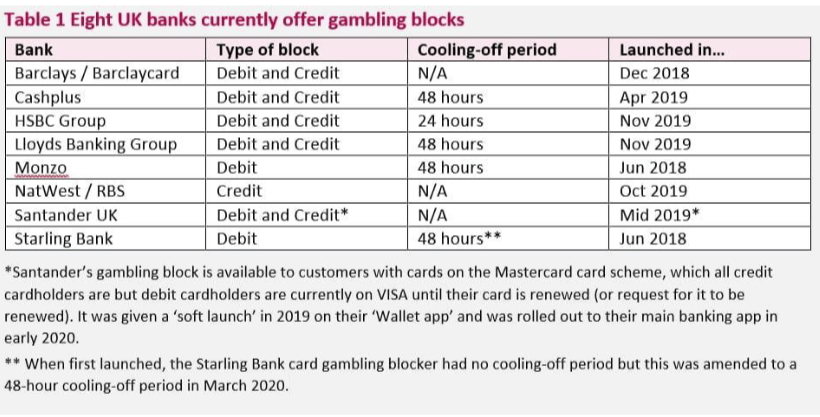Lloyds Gambling Block
Halifax has become the latest bank operating in the UK to allow its customers to block transactions made on gambling websites, joining the likes of Barclays, Lloyds, Santander, and RBS. The new blocking feature has been designed ‘in recognition of the ways in which the bank can support customers to manage their money and gamble responsibly’. Gamban Partners with Lloyds Banking Group To Help Customers Block Access to Online Gambling with Gamban formatquoteGambling addiction is a complex problem and offering vulnerable customers a multi-layered form of protection is the best approach to help people control gambling activityformatquote. Three major UK banks RBS, Lloyds and Santander have joined Barclays in an effort to introduce responsible gambling measures by blocking transaction payments to bookmakers. The scheme would allow problem gamblers the option to opt out of allowing payments to any company that is associated to gambling and issued a UKGC licence. Most readers will. Gamban Agrees on Multi-brand Gambling Block Deal with Lloyds Bank. By Victoria Hughes, 26 February 2020. Gambling blocking software maker Gamban has secured a partnership with Lloyds Banking Group. As part of the arrangement, customers of the Group will have access to Gamban’s software which prevents payments for gambling-related products. First off, how did we get here? It all began on the 14th of April 2020. All Gambling Operators with a license from the United Kingdom Gambling Commission.

Gambling blocking software maker Gamban has secured a partnership with Lloyds Banking Group. As part of the arrangement, customers of the Group will have access to Gamban’s software which prevents payments for gambling-related products or services.
Gamban Agrees on Lloyds Banking Group Deal © Pixabay.
Gamban confirmed integration to Lloyds Banking Group platform had already been completed, and said demand for the product was high with a “significant number” of users have already signed up for the service.
Lloyds’s Group customers, which include Bank of Scotland and Halifax as well as Lloyds bank, have access to the Gamban software as well as the company’s own ‘Lloyds Banking Group Gambling Transaction Freezes’. Customers can access their mobile banking app and totally prohibit gambling or set maximum monthly amounts if they wish to control their spending.
The founder of Gamban, Jack Symons, paid tribute to the banking giant for having the foresight to enter into an agreement that can protect vulnerable customers. He said:

It’s very positive to see forward-thinking banking institutions such as Lloyds Banking Group rise to the challenge of protecting vulnerable customers from gambling addiction through barriers such as spend control and collaboration with market-leading gambling-blocking technology, Gamban.– Jack Symons, Gamban founder.
In a statement on the agreement, Elyn Corfield, Managing Director, Consumer Finance, Lloyds Banking Group said the bank understood that gambling-related harm can have serious and long-term impacts on their customers and was committed to enabling a range of support measures to help them. Corfield said the partnership with Gamban, which would give customers three months free access to the software, would complement the company’s own harm prevention measures.
Gamban, who is based in Southampton, has enjoyed huge success with their software that can be used on various operating systems as well as mobile devices. The software has been used in GambleAware’s suite of treatment tools since October 2018.
The banking sector, like the gambling sector, has been increasingly subject to regulatory and public pressure to increase social responsibility efforts. Banks are increasingly expected to show a duty of care towards vulnerable customers. Stakeholders in both industries have been encouraged by regulators to work together to find solutions.
Collaboration between banks and gambling companies may become much more common if affordability checks are introduced. Mentioned in the All-Party Group on Gambling Related Harm interim report, the Group said that improved affordability checks are urgently needed.
The Group said there are no stake and spend limits for players when gambling online and added that it is simply not good enough for the online operators to say they are ‘developing affordability checks’.
The reportsaid operators should have a clear understanding of what is affordable to online users and this should be calculated on a proportion of a gambler’s income, something the operators would need help from financial institutions to set this limit.
Related Articles

Gordon Moody Association to open residential gambling treatment centre for women
GambleAware: BAME communities disproportionately impacted by gambling harms
GambleAware reports tracks progress of expanded National Gambling Treatment Service
Three more UK high-street banks have announced plans to allow customers to control and block particular payments via mobile applications, following Barclays’ lead.
Lloyds, Santander, and RBS have approved proposals to develop payment-blocking functions that are set to affect transactions made in high street bookmakers and online betting sites and provide greater protections to those who have an issue with compulsive gambling.
The move comes after Barclays announced back in December a plan to integrate a ‘gambling block’ component across its customer-facing digital platforms.
The trio will update mobile banking apps in order to ensure customers are able to take control over when and where money can be spent.
RBS, which currently has approximately 30 million customers, announced that it would be implementing similar measures to those issued by Barclays late last year.
Lloyds Gambling Blocking
Barclays’ gambling-block feature allows customers to turn off engagements with all gambling-related properties, as well as blocking payments in four additional categories: food and drink; petrol stations; groceries and supermarkets; and premium websites and phone lines.
Customers will also be able to implement controls that are specifically designed to limit withdrawals from ATMs, as well as credit card purchases both in-store and online. Santander and Lloyds are also due to implement similar controls for the 14 million and 22 million customers respectively.
Lloyds Gambling Block Software
A spokesman for Lloyds commented: “Throughout 2019 we will be enhancing our customer communications so customers are informed and alerted to their gambling spend, as well as introducing tools to improve self-service options such as gambling restrictions.
“New card controls give customers more control over debit card transactions for extra peace of mind.”
Lloyds Tsb Block Gambling
Following Barclays’ announcement to develop blocking functions late last year, Marc Etches, chief executive of GambleAware, welcomed the initiative: “There are 340,000 problem gamblers in Britain and a further 1.7 million at risk, and initiatives like this can play an important role in helping to reduce gambling-related harms.
“There are no limits to stakes and prizes for online gambling, and credit cards are allowed so it is important to make it easier for people to control their spending.”
While the move comes as a positive step towards tackling compulsive behaviours, responsible gambling advocates are continuing to campaign for a significantly longer ‘cooling off’ period between deactivating a payment block and the ability to complete transactions.